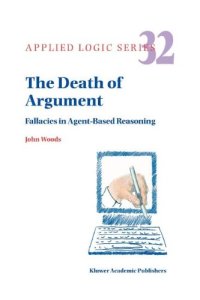
Ebook: The Death of Argument: Fallacies in Agent Based Reasoning
Author: John Woods
- Genre: Mathematics // Logic
- Tags: Logic, Science general, Philosophy of Law, Linguistics (general)
- Series: Applied Logic Series 32
- Year: 2004
- Publisher: Springer
- Language: English
- djvu
The present work is a fair record of work I've done on the fallacies and related matters in the fifteen years since 1986. The book may be seen as a sequel to Fallacies: Selected papers 1972-1982, which I wrote with Douglas Walton, and which appeared in 1989 with Foris. This time I am on my own. Douglas Walton has, long since, found his own voice, as the saying has it; and so have I. Both of us greatly value the time we spent performing duets, but we also recognize the attractions of solo work. If I had to characterize the difference that has manifested itself in our later work, I would venture that Walton has strayed more, and I less, from what has come to be called the Woods-Walton Approach to the study of fallacies. Perhaps, on reflection "stray" is not the word for it, inasmuch as Walton's deviation from and my fidelity to the WWA are serious matters of methodological principle. The WWA was always conceived of as a way of handling the analysis of various kinds of fallacious argument or reasoning. It was a response to a particular challenge [Hamblin, 1970]. The challenge was that since logicians had allowed the investigation of fallacious reasoning to fall into disgraceful disarray, it was up to them to put things right. Accordingly, the WWA sought these repairs amidst the rich pluralisms of logic in the 1970s and beyond.
This book is a sequel to the classic work, Fallacies: Selected Papers 1972 - 1982 (1989), coauthored with Douglas Walton, and is a further major contribution to the Woods-Walton Approach to the logic of fallacious reasoning. No one disputes the formitable accomplishments of modern mathematical logic; but equally no one seriously believes that classical logic is much good for the analysis of real-life argument and reasoning, or that it is the best place in which to transact the business of fallacy theory. One of the principal innovations of the book is its adaptation of systems of logic to the particular requirements of fallacy theory. The book develops logical analyses which take into account such features of real-life cognitive agency as resource- availability and computational complexity.
The book is also an invitation to interdisciplinary cooperation, linking the relevant branches of logic with computer science, cognitive psychology, neurobiology, forensic science, linguistics, (including conversational analysis and discourse analysis) and argumentation theory.
Another distinctive feature of Woods’ approach to fallacy theory is its recognition of the highly defeasible character of fallacy-attributions. On this view, reasoning is fallacious only in relation to the cognitive target that the reasoner seeks to hit, the standard required for its attainment, and the cognitive resources available to the reasoner. Accordingly the so-called Standard Treatment of the fallacies is seriously misconceived.
Getting the fallacies right is an extremely important task for logic, indeed a central part of its mandate. It is a task much more avowed than performed. The Death of Argument is a major attempt to redress this inbalance.